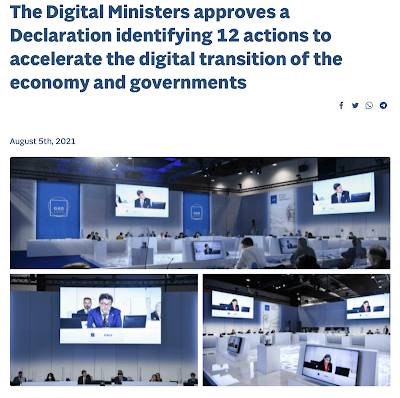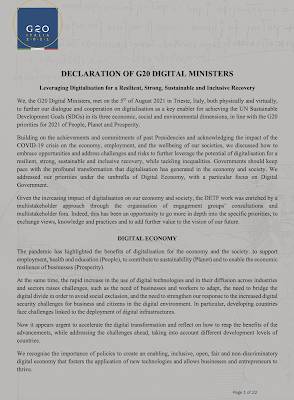
To almost no fanfare, in early August 2021, the G20 Ministerial Meeting on digitalization was held in Trieste, Italy as shown here:
For those of you that are less familiar with the G20, the group consists of Argentina, Australia, Brazil, Canada, China, Germany, France, India, Indonesia, Italy, Japan, Mexico, the Russian Federation, Saudi Arabia, South Africa, South Korea, Turkey, the UK, and the US along with the European Union.
Let's open this posting with this promotional video for the Digital Ministers' Meeting:
Here is another video showing the arrival of the VIPs noting the on again, off again use of face masks and personal distancing as shown here:
The meeting was organized into two work streams; the digital economy and digital government. Here is a quote from the pre-meeting press release with my bold:
"In the latter area (the digital economy), the discussion will primarily focus on the role of digital identity as a tool to provide citizens with both a secure identification method and a trustworthy access to digital services. Secure and privacy-compliant digital identity solutions facilitate the continuous and reliable delivery of public services and unlock full participation in society. In addition, the Italian Presidency has encouraged information sharing among Members by mapping best practices showing how governments can transform themselves and make the most of digital technologies such as artificial intelligence and data, to better serve the economy and society."
Remember that; a digital identity will allow citizens to "unlock full participation in society".
Now, let's look at the post-meeting press release:
"…Ministers recognized their responsibility to work together to increase the overall positive effects of digitalisation, building on common objectives and converging on action principles as a means to accelerate the digital transformation and reflect on how to reap its benefits, while addressing the challenges ahead."
The G20 Digital Ministers signed a Declaration which identifies 12 actions to accelerate the transition to a digital economy. Here is the cover page of the Declaration:
You will note that the Digital Ministers invoked the COVID-19 crisis as one of the key reasons why there is a need for a digitalization of the economy:
"Building on the achievements and commitments of past Presidencies and acknowledging the impact of the COVID-19 crisis on the economy, employment, and the wellbeing of our societies, we discussed how to embrace opportunities and address challenges and risks to further leverage the potential of digitalisation for a resilient, strong, sustainable and inclusive recovery, while tackling inequalities….
The pandemic has highlighted the benefits of digitalisation for the economy and the society: to support employment, health and education (People), to contribute to sustainability (Planet) and to enable the economic resilience of businesses (Prosperity)."
Here are the key aspects of the declaration with my bolds throughout:
"1.) Digital Transformation in Production for Sustainable Growth. Ministers commit to leveraging digitalisation for an economic recovery that intends to be resilient, strong, sustainable and inclusive, in the three dimensions of “people, planet and prosperity”, leaving no one behind. Ministers recognise that companies have to be prepared for the “new normal” and for further technological shifts, in order to cope with future challenges towards a sustainable, open, shared and more innovative economy. They acknowledge that there is a need to increase efforts on developing a human-centered approach to digital economy that also takes into account the needs and perspective of traditionally vulnerable groups. Ministers therefore commit to take action towards reinforcing industrial policies and international cooperation for the digital transformation of production for sustainable growth, in a way beneficial to all.
ii.) Leveraging Trustworthy Artificial Intelligence for MSME Inclusiveness and Promotion of Startups. Ministers reaffirm their willingness to implement trustworthy Artificial Intelligence (AI). They acknowledge the need to bolster the AI capabilities of MSMEs (micro, small and medium enterprises), including their capability to use data, access finance, share opportunities, and build a talented and skilled workforce.
iii.) Measurement, Practice and Impact of the Digital Economy. To support an inclusive and multi-stakeholder dialogue on measurement, Ministers affirm that the 2020 Roadmap can help ensure that measurement of the digital economy remains a priority in G20 countries and in International Organisations, and that adequate resources are devoted to its implementation. They value the contribution of sharing good practices, also in relation to monitoring digital economy developments beyond the G20 itself, especially with regard to the measurement of AI and the digital gender divide.
iv.) Consumers Awareness and Protection in the Global Digital Economy. Ministers commit to take action to raise awareness, educate and support consumers, including through digital literacy programs, with the aim of preventing the detriment of consumers and ensuring consumer protection regarding product quality and safety, privacy and personal data protection, and unfair commercial practices, with particular consideration for vulnerable consumers. They also stress the need to promote stronger international cooperation, including between consumer protection authorities. Furthermore, the Presidency opened the dialogue on distributed ledger technologies, such as blockchain, and produced a G20 Report on Blockchain in Global Value Chains to increase knowledge on transparency and accountability of products for the benefit of consumers.
v.) Child Protection and Empowerment in the Digital Environment. Ministers are pleased to include the protection and empowerment of children in the digital environment, for the first time, among the priorities of the G20 Digital Economy. They stress theshared responsibility of different stakeholders, especially the providers of digital services and products, in creating a digital environment that both empowers and protects children. To promote a safe, secure, inclusive, transparent and beneficial digital environment for children, centered around age-appropriate and high-quality online content, Ministers are guided by the G20 High Level Principles on child protection and empowerment, drawn from the OECD Recommendation, which can be instrumental to guide policies.
vi.) Encourage Innovation for Smart Cities and Communities. Ministers welcome the Italian Presidency’s Report of G20 Practices of Innovative Public Procurement for Smart Cities and Communities, as a tool to increase and share knowledge.
vii.) Connectivity and Social Inclusion. Ministers affirm their commitment to bridge connectivity gaps, and encourage the goal of promoting universal and affordable access to connectivity for all by 2025. They believe that enhanced collaboration and exchange of practices at international level and interaction with stakeholders can contribute to our connectivity and social inclusion goals.
viii.) Data Free Flow with Trust and Cross-border Data Flows. Building upon and recognising the work and achievements of the Japanese and Saudi Presidencies, Ministers acknowledge the work of the OECD on Mapping Commonalities in Regulatory Approaches to Cross-border Data Transfers, which identifies “commonalities, complementarities and elements of convergence” across different approaches. Such commonalities can foster future interoperability.
2.) Digital Government:
ix.) Digital Tools for Public Services and Their Continuity. Moving from the 2018 G20 Digital Government Principles, developed under the Argentine Presidency, Ministers focused on how to guide and improve the digitalisation of public services to better meet the needs of citizens. They therefore commit to pursue and ensure the quality, diffusion and accessibility of digital public services, and to foster better skills for civil servants.
x.) Digital identity. The importance of easily usable, reliable, secure, trusted, and portable digital identity solutions is recognised as a means to guarantee secure access to digital services to citizens and businesses, protecting their privacy. Reference is also made to the potential of digital identity in emergency and humanitarian aid contexts.
xi.) Agile Regulation. The role of agile regulation in fostering innovation and economic growth, as well as in controlling and preventing possible negative impacts of technological progress on society and on the planet is acknowledged. The contribution of the Survey on agile regulation across G20 Members is welcomed as a useful tool to share experiences and common approaches to more agile governance and regulatory models for innovation.
Under the newly signed declaration, transformation of the task force into a permanent Working Group will take place. Ministers commit to continue working towards digitalization for resilient, strong, sustainable and inclusive recovery while tackling inequalities. In this regard they welcome the transformation of the Digital Economy Task Force (DETF) into a Digital Economy Working Group (DEWG)."
A good portion of this declaration reflects the World Economic Forum's technocratic vision for the future
Given the move by several governments to implement a digital identity with step one being the issuance of a vaccine/immunity/health passport, let's focus on the G20's vision of a digital identity. Here's more of what they had to say with bolds being mine:
"We acknowledge that easily usable, reliable, secure, trusted, and portable digital identity solutions that guarantee privacy and the protection of personal data, could enable G20 Member States to meet the needs and expectations of public and private sector users and, for example, they could improve accessibility to social benefits, however provided. We note that during the pandemic, the domestic adoption of digital identity to support access to both public and private sector services has accelerated. We support technical solutions that are based on the users’ freely given, specific, and informed consent, and protect citizens’ privacy and personal data, within the domestically applicable legal frameworks. We recognise that receiving government services by means of digital identity should not completely replace other means of accessing services, in order for citizens to meaningfully consent to the use of digital identity. While connectivity remains the main enabler, we recognise the potential contribution that digital identity solutions may have in supporting countries in the attainment of the United Nations Sustainable Development Goal Target 16.9: “to provide legal identity for all”.
We welcome the opportunity to support international dialogue on digital identity by sharing practices, including through the G20 Collection of Digital Identity practices, developed in collaboration with the OECD, and gathering experiences of interoperable, portable and reusable digital identity as a tool that can transform the capacity of citizens to timely access the benefits and services they are entitled to.
We believe that such a learning exercise could provide useful insights to the development and improvement of national e-ID schemes, and contribute to future discussions to encourage harmonising digital identity standards and regulations as a key to achieve interoperability between different platforms and frameworks with appropriate data protection to prioritise users’ privacy. We will pursue further work to find technology solutions that are suitable in internet-scarce settings including in humanitarian and emergency scenarios to provide a digital identity."
Like so many of these programs, a global legal identity for all sounds wonderful on the surface but don't scratch too hard or you may find that you are disappointed by how the implementation of a digital identity turns out in the end. Given that the United Nations is involved, the use of a global legal identity fits in well with their plans for a global parliamentary system.
Let's close this posting with a video which summarizes the decision made regarding the transition from a task force studying the idea of a digital economy with one of the pillars being a digital identity (aka a digital green certificate) which is stated as being an imperative:
Now that you have learned more about the background movement to a digital identification/digital green certificate by a group of the world's most influential nations, you may have a better understanding of the haste to implement a vaccine/immunity passport, the first step of many to implementing an all-encompassing digital identification which, as we know, will give government access to all of our information. As is becoming apparent, governments including Canada, France, Germany and the United Kingdom are using digital identification as a means by which people that have made a personal choice not to be vaccinated with one of the experimental vaccines are excluded from many of life's activities, creating a COVID-19 apartheid system. As I noted above, the G20 states that a digital identity. will allow citizens to "unlock full participation in society". The current reality could not be further from the truth but then what should we expect from governments that have become addicted to their unfettered powers that they have granted to themselves as part of their toolkit to battle a pandemic that has an infection fatality rate that is not all that dissimilar from the infection fatality rate of seasonal influenza.
But then again, when have governments ever let a perfectly good crisis go to waste?
You can publish this article on your website as long as you provide a link back to this page.



Be the first to comment